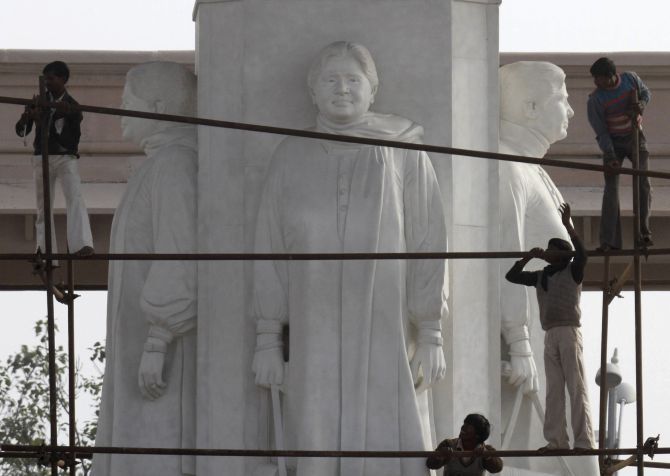Bahujan Samaj Party supremo Mayawati told the Supreme Court on Tuesday that construction of her life-size statues and the party's symbol, elephant, at various places in Uttar Pradesh during her tenure as state's chief minister represents the "will of the people".

She drew the attention of the apex court that even the Congress Party in the past has installed statues of its leaders including Pandit Jawaharlal Nehru, Indira Gandhi, Rajiv Gandhi and P V Narasimha Rao across the country.
She also referred to recent instances of installation of statues by state governments, including the statue of Sardar Vallabhai Patel which is known as 'statue of unity' in Gujarat.
Besides, she said that the present Bharatiya Janata Party-ruled Uttar Pradesh government has initiated construction of a 221 metre high Lord Rama statues in Ayodhya at the cost of state exchequer.
Thus, construction of memorials and installation of statues was not a "new phenomenon" in India, she said.
"Similarly, other political parties in power at both the Centre as well as state governments have also installed statues of various other leaders at public places at the cost of public exchequer from time to time but neither the media nor the petitioners have raised any questions with respect to them," she said in an affidavit filed in the top court.
The Supreme Court is hearing a petition filed in 2009 by an advocate who had alleged that about Rs 2,000 crore was used from the state budget for 2008-09 and 2009-10, when Mayawati was the chief minister of Uttar Pradesh, for stalling her statues and BSP's symbol at different places.
Mayawati said in her affidavit that construction of memorials and installation of statues in the state are intended to promote the values and ideals of social reformers and not to glorify herself or to promote her party's symbol.
The BSP chief said she has dedicated her entire life for upliftment of downtrodden society and for achieving this, "I also took a decision to remain unmarried".
Mayawati said that issues related to utilisation of funds for a particular public purpose by the state government are "not justiciable" and funds for construction of these memorials and installation of statues were sanctioned through budgetary allocation after approval of budget by the state legislature.
The Dalit leader was responding to the notice and the oral observation of the apex court which had on February 8 observed that Mayawati should deposit public money used for erecting statues of herself and the party's symbol to the state exchequer.
Mayawati sought dismissal of the plea, which has alleged that public fund was misued, saying it was "politically motivated" and is in gross abuse of the process of the court.
The BSP supremo said "some disgruntled elements could not digest" such an amount of respect for a Dalit woman leader and resorted to filing pleas in the apex court as well as high court.
"The will of the people was expressed by the state legislature with a proposal to install the statues of the answering respondent (Mayawati) at the memorials to show their respect to contemporary woman Dalit leader who has decided to sacrifice her life for the cause of the underprivileged communities which includes Dalits, downtrodden, Scheduled Tribes and economically weaker sections in all the communities," the affidavit said.
It further said, "In these circumstances, the statues of the answering respondent (Mayawati) came into being as the will of the state legislature to represent the will of the people.
"It is submitted that the funds for the construction of the said memorials and installation of statues have been sanctioned through budgetary allocation after approval of the budget by the state legislature and the passing of relevant Appropriation Act by the state legislature in accordance with the Constitution of India and the rules," the affidavit said.
It said it is clearly evident that it is state legislative assembly which controls the amount to be sanctioned out of the demands for grant placed by the government and it is the state legislative assembly which is the final authority to decide the quantum of monies to be sanctioned.
These memorials are major tourist attraction in Lucknow and generating huge revenue daily for the state through sale of entry tickets, she said.
It said that elephant statues were not for promotion of BSP symbol but only part of architectural design.
"They (statues of elephants) were installed as welcome arches since ancient times. Statues of elephants also stand installed in large numbers at Rashtrapati Bhavan starting from the entrance gate itself," it said.
"The elephant statue lies on the top of the Speaker's chair in Parliament which is a sign of welcome to all the members of Parliament. They have also been installed at Raj Bhavans and various other historical buildings and temples," the affidavit said, adding, it is a "coincidence" that BSP has been given election symbol 'Elephant'.
The affidavit said statues of elephants have been extensively used in various temples and monument in several countries like Nepal, Sri Lanka, Vietnam, China and Thailand and also at public places at New York, London and Bangkok.
"These memorials reflect the aspirations of the oppressed and downtrodden sections of the society who have been marginalised by the caste system," it said.












 © 2025
© 2025